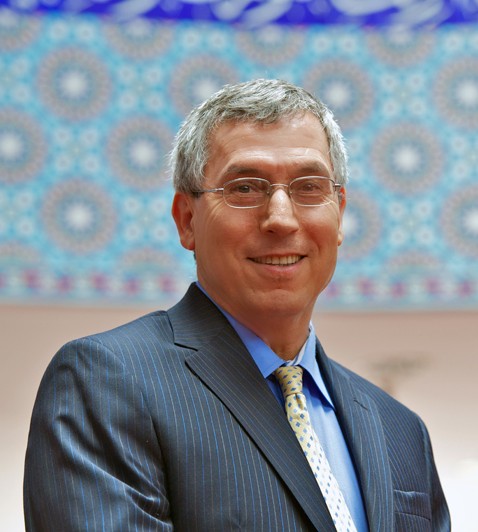
Hamoud Salhi, associate professor of political science, specializes in international politics and comparative politics with an emphasis on the Middle East and Northern Africa, terrorism and counterterrorism, and political change in the Third World. He was in Algeria over winter break, during which time he joined a panel of experts to discuss American foreign policy and the Arab Spring.
Dateline caught up with Salhi last week and asked him about this trip and his thoughts on events in the Middle East.
Dateline: Why were you in Algeria and for how long were you there?
Hamound Salhi: I was in Algeria for 10 days. I was invited to join in a panel on America foreign policy and the Arab Spring. I took the opportunity to spend some quality time with the family, as well.
Dateline: On the panel organized by the newspaper El Moudjahid, you were both an insider and an outsider, being Algerian but living permanently in the U.S. and speaking as an expert in American foreign policy in the region. How does having ties to both countries/regions benefit or hinder your perspective and opinions?
HS: Having ties to both countries has more benefits than drawbacks. I am able to address issues and speak to them from different perspectives considering that I am familiar with the nuances, political cultures and historical specificity of each country. One major benefit is access to reliable sources. Because of my involvement in the media and having completed my undergraduate studies in Algeria, I am in constant contact with the major players in the region, including in the government, the media, and the academia. As such, my goal has been to use those sources in my research, teaching and commentaries to enhance my understanding of this region and add value to my contribution to the field of my studies. And my views are sought out by organizations and individuals, as well. The region always inquires about U.S. behavior, not just in their part of the world, but elsewhere. Being here and from there gives me a distinct authority.
But it can be daunting too. For example, it has been difficult for me to root out conspiracy theories that float frequently in the Middle East and Northern Africa. Having been trained in the U.S. in the philosophy of evidence, I have found some audiences in the region unhappy when I reply that I have no substantial facts to support a claim, or when I ask someone for their supporting evidence. During this last trip a former official in the Algerian government insisted that the Arab Spring was in the U.S’s grand strategic plan and that the U.S. knew all along what was coming to the region. Apparently, the official was not satisfied with my position that the Arab Spring took the U.S. by surprise. Ironically, many journalists in the audience were in agreement with the official, believing that the entire revolutionary ordeal in the Middle East and Northern Africa was a conspiracy.
![actualite2[36987]](https://news.csudh.edu/wp-content/uploads/2013/02/actualite236987.jpg)
HS: The chaos that ensued, the fear of terrorism that has re-emerged in countries like Libya, Syria and Egypt, the rise of Islamist organizations to political power in Egypt and Tunisia and the future of the region are among the issues that the region seems to be concerned about. On a personal level, you can feel a sense of encouragement that people are more convinced than ever that the current situation (oppressive rule, high unemployment rates, corruption, etc.) cannot go on forever, that change -no matter how bad it can be–was inevitable, and that it is just a matter of time.
Dateline: You were in Algeria at an interesting time, with the hostage crisis at Ain Amenas in eastern Algeria, and the escalating conflict in neighboring Mali. How were these events conveyed in the media there?
HS: Let me just say at the outset that I feel deeply saddened by the fate of the hostages killed and those who went through that traumatic ordeal. I can tell you that many Algerians felt the same way but saw the Algerian military actions as necessary. This sentiment was highlighted in the national media, including television. As for how the events were conveyed in the media, in general the Algerian media was critical of the way the Algerian authorities handled the security of the gas plant in Ain Amenas and demanded full accountability. Also, the Algerian media questioned the wisdom of France’s intervention in Mali. They thought it was ill conceived and could have severe implications on the region’s stability. The Arabic press, in this instance, went even further, portraying French interventionism as rooted in France’s colonial legacy and its current leadership’s longing for that era.
Dateline: How does being in a region that has been thrust under the international spotlight inform your understanding, analysis and teaching of the events shaping the region and world?
HS: In major ways. My goal has been to pass on the information and knowledge I have of this region to my students. Take my international politics course, for example. The region has attracted so many international players that my students are expected to know. This includes the U.S., with its plan to establish an African Central Command (AFRICOM) in Africa, and which is currently contemplating establishing a military base in Niger, complete with drones to gather intelligence on terrorism activities; China with its huge economic dealings in Algeria; France with its long colonial legacy; and the United Kingdom, which signed a security partnership agreement with Algeria just last week. Furthermore, the fact that I am fluent in the languages in this region has added a unique value to my lectures; for instance, I am able to present America’s foreign policy in this region from a perspective of how the region itself views us, not just how we think they view us.